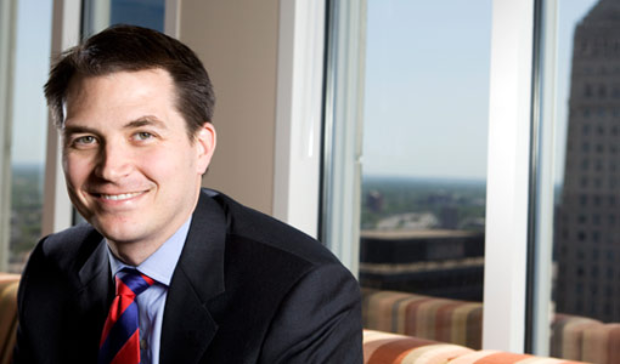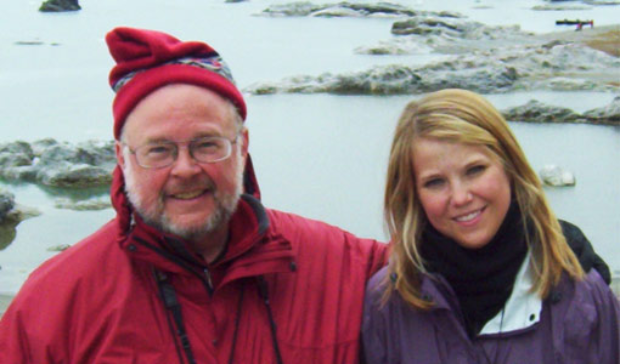Rob Parish holds a place of honor at the University of St. Thomas School of Law. In addition to being a husband, father and an associate in the finance and restructuring practice at the Minneapolis law firm of Faegre & Benson, Parish was the very first applicant for the very first class.
Parish’s application brought “much excitement,” recalled Director of Admissions Cari Haaland. “Not only was he the first applicant but he presented himself as a strong candidate to UST Law. It was clear through his application materials that Rob was a leader.”
When Parish contacted Professor Neil Hamilton last winter, he said, “I don’t know if you remember me, but I’m Rob Parish.” Hamilton responded that, of course, he remembered Parish, noting, “we all took risks together” coming to a brand new law school.
But Parish didn’t see it that way. The School of Law was connected to a well-established university, and the background of founding Dean David Link and the inaugural faculty inspired his confidence. “It just didn’t feel that risky to me,” Parish said.
Adjusting to Law School After Military Service Parish grew up in the Minneapolis suburb of Minnetonka and received his undergraduate degree from the University of Wisconsin-Madison. He studied political science and international relations, the kind of majors Parish said that “prepare you for everything and nothing.” He also joined the ROTC.
After graduating in December 1996, he spent a year training to be an intelligence officer at Goodfellow Air Force Base outside San Angelo, Texas. When his training was complete, he monitored the southern no-fly zone in Iraq and served in the Kosovo campaign. “I loved the military,” he said. “It was a great experience.”
As the four-year ROTC commitment drew to an end, Parish had to decide if he was going to extend his time in the Air Force or find something else to do with his life. He decided to try something new.
He and his wife, Amy, returned to the Twin Cities. “It felt very odd,” Parish said. “This was the first time since I started college that I didn’t know what came next.” After examining his interests and abilities, he decided to attend law school.
Parish applied to all four law schools in the Twin Cities, and chose St. Thomas. “It was different and new,” he said. “That appealed to me.”
Appealing – and a culture shock. As a new institution, the School of Law was in the process of establishing policies and procedures. It was not uncommon for situations to arise for which there were no policies in place. That was a very different situation than the military, which “has policies for everything, down to the placement of the crease in your sleeve,” Parish said.
He also was drawn to the school’s mission, which is just as important to alumni practicing commercial law as it is to those doing public service work. “I remember Professor Lisa Schiltz talking about the mission at the end of our contracts class – first semester, first year,” he said. “She said basically it came down to this: If you have the chance to do something sleazy, don’t!”
Parish also remembered all the people who went out of their way to help him access his GI Bill benefits at the School of Law, which at the time was only provisionally accredited. Everyone from Sen. Paul Wellstone to Rep. Martin Sabo to Professor Patrick Schiltz took up the cause, which eventually was successful.
UST law proved to be a good fit for Parish. He found the experience to be both challenging and rewarding, one that required a lot of hard work. He also found that the flexibility of a law student’s schedule made law school a great time to have children. “Other than when you are in class, your time is your own,” he commented.National Financial Crisis Creates a Busy Practice
After graduating in 2004, Parish clerked for the Hon. Robert J. Kressel, chief judge for the Bankruptcy Appellate Panel for the Eighth Circuit in Minneapolis. “There’s no better way to learn the inner workings of the courts,” Parish said. “It’s a valuable training ground for private practice,”
He then spent a year working for a hedge fund, TPG Credit Management L.P., Texas Pacific Group, where he closed deals for complex financial transactions. “Dealing with distressed assets was especially interesting,” he said.
Now, Parish does bankruptcy work in Faegre & Benson’s finance and restructuring practice. In these chaotic financial times, it’s a very busy practice. “Partners have told me the last time the volume was this heavy was in the early 1980s,” he said. His group works with companies that are in distress and financial institutions that have made loans to now-insolvent companies.
For Parish, the benefits of working in a large firm are many. “I’ve never had to look for work,” he said. “There has always been a lot of interesting and complex work.” In addition, large firms have lots of human resources – both attorneys and support staff – who can be pulled in when big cases heat up.
The down side? It’s difficult to get to know people outside of one’s main working group, Parish said.
He also has found it a challenge to balance a demanding practice with raising four young children. Parish appreciates the independence and flexibility of his work and often works from home before driving his oldest daughter to first grade, and after the kids are asleep.
Parish is up to the challenge. Like many busy professionals he works hard in all areas of his life – with his family, in his practice and as a UST Law alumnus. The UST law community has seen Parish as a rising star since he submitted that very first application, and he continues to soar.
Read more from St. Thomas Lawyer.





